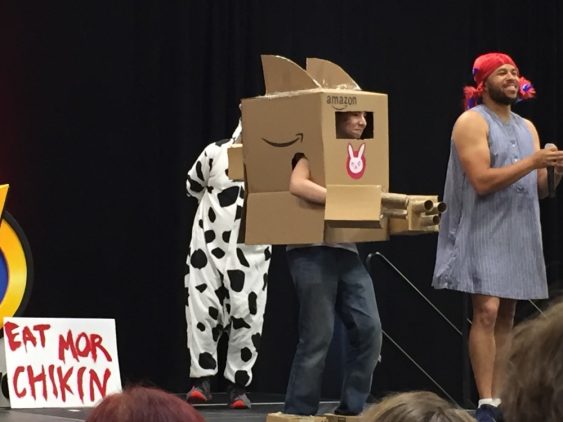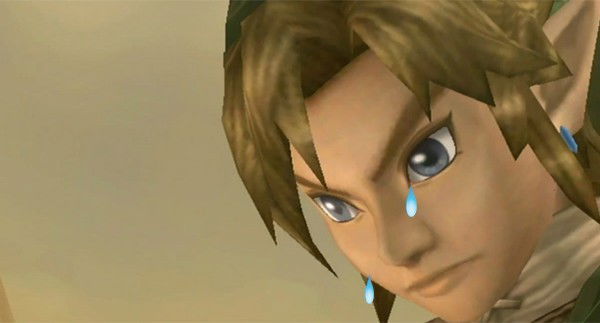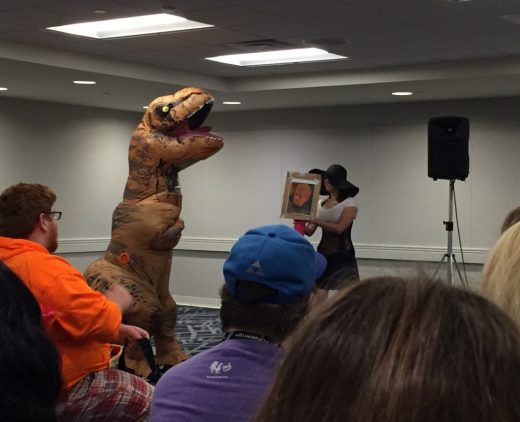Let’s face it, when you’re at a con, there’s only so much time in the day. Lots of cool things are happening at the same moment, so when you decide to go to a panel, you’re likely sacrificing the chance to see something else. In short, it better be a worth it, right? The Zelda panel I went to this past Friday at Matsuricon in Columbus, Ohio was not worth it. Not in the slightest.
Anime conventions can feel very much like a young person’s game. When you’re 29, it isn’t too hard to notice that you’re in the minority when exploring the hallways of a convention center in the midst of a mostly teen crowd predominately cosplaying as characters from the latest and greatest anime, or Naruto. This isn’t a bad thing—young and old, male and female, Geralt and Sasuke—everyone belongs at a con.

Even this guy.
Regardless of what you decide to do—whether you’re a veteran cosplayer or simply an aging anime fan—in my eyes, the saving grace of anime conventions for older attendees can be found in the panel schedule. The vendor’s room can be okay, the cosplay watching is always fun, but the panels are where it’s at. This is why a panel-gone-wrong can be so heartbreaking.
Before I go further, I need to stress that Matsuricon had (and always has) some amazing panels hosted by some insightful and entertaining guests. This just wasn’t one of them.
The panel in question was titled “Lore in the Zelda Universe.” They had me at ‘lore,’ really. There’s nothing I love more than digging into the lore of something, anything. World-building is a cool and difficult thing to do, and the deeper it goes, the more I like it (don’t even get me started on The Wheel of Time). It was only an added bonus that The Legend of Zelda, a staple of my childhood, was the topic. Here’s the description of the panel.
“Go beyond the basic story of the golden goddesses and learn other lore and mythology of the Legend of Zelda universe and what impact it has on the series.”
Sounds great, so why not? Well…
When I go to a panel, I generally want one of two things to happen. The first one would be to learn something new or interesting. That can mean gaining some industry knowledge and hearing funny anecdotes from voice actors (I don’t even have to be familiar with their work to enjoy this, as I learned from the cast of Slayers). Or, it can mean some actual teaching, as happened in a great panel about potential zombie viruses during Ohayocon 2015 hosted by a man with a master’s degree in some bio-molecular stuff (all it would take would be one random genetic mutation and boom, undead everywhere).
If a host doesn’t intend to educate me on something new, then at the very least, they should entertain me. Hours after the Zelda panel, I attended one called “Implausible Fanfiction,” hosted by the A Slap on Titan crew. I learned nothing and it was amazing. They simply read and acted out ridiculous fan-fiction and had me laughing until I cried within first ten minutes. I’m not lying—I actually cried. Check those people out right now.
A Velociraptor about to have sex with noodle Joffrey during the A Slap on Titan Panel
Unfortunately, the Zelda host did neither of these things. And as if we weren’t in for a terrible panel anyway, there was a technical difficulty: the mic wouldn’t work. I can’t blame this on the host, but it didn’t help things (this should’ve been addressed by the con staff, actually). The host resorted to yell-talking. Oh boy!
I learned an important lesson about mics right then. Microphones provide an amplified voice (obvious), giving the totally normal person the voice of a god, a convention god. By way of the very volume of their voices, the panelists can better subdue the crowd into listening (sure, there are assholes everywhere who like to ruin things, but they are the exception). When there is no mic and someone must yell-talk, they do not seem important, and thus, the crowd devours them. From here, a panel can quickly descend into a realm of immature comments and all-around dumbness.
At first, I was pretty annoyed by the crowd. “Give the host a chance,” I thought. “Be more like Link and shut your mouths.” And for a while, they did.
When it finally got started, the host began by telling the crowd the origins of the Triforce, all about Din, Nayru, and Farore. “Okay,” I thought. “So this is going to be somewhat like a history lesson mixed in with some theorizing, hopefully relating Zelda lore to popular mythology.” I was intrigued. Will we get into chronology debates? Will we speculate about Breath of the Wilds? Will we make interesting connnections? I quickly learned we would not.
After the host told us the bit about the Golden Goddesses, the audience was then treated to a retelling of the events of Skyward Sword for about 40 minutes or so. The panel never made it much further than that, nor did it ever theorize about things the crowd may never have known or considered. There was no thesis; no knowledge shared beyond that which everyone who had played the games (which was everyone in the audience) already knew.
The way in which the host just rambled made me think that someone who was constantly annoyed by the host’s Zelda fanaticism suggested putting together this panel as some sort of cruel joke on an unsuspecting audience. I myself considered leaving about halfway through but decided to stay in case it went somewhere. Maybe we would arrive at some point where everything came together and it was all worth it. We didn’t.
Ultimately, there wasn’t even an illusion of a “show.” This extended into the visual portion of the panel as well. The host had images to share that went along with most of the general fumbling, but it wasn’t even prepared into a slideshow. There were literally just a bunch of images thrown into a folder. When the host needed to go to the next image, an assistant closed the image currently shown and clicked around, searching through the folder while the host said, “No, not that one. Up one. No, down. Yeah, that one.” It was less than professional. I don’t expect panel hosts at anime conventions in central Ohio to be like the Sony E3 show or anything, but c’mon! Can you put some preparation into it, please?
In reality, the panel only became fun once I realized I didn’t need to be annoyed at the interrupting crowd—there was nothing substantial to interrupt—and to just enjoy the madness. My friend and I could laugh after that, because there was humor in this. It became even funnier when someone would give a solid suggestion, a thoughtful insight into the Zelda universe and the host would respond with a single “yeah.” No back and forth, no interaction, no exchange, just one word that conveyed there would be no derailing from the host’s train of thought.
When a panel stops being about the material or the subject at hand and the audience becomes focused on how bad it is or how unnatural it’s being hosted, that is bad. A panel is a show, and shows need to entertain an audience. If you beckon over 100 con attendees to your panel promising Zelda, and all you have to give them is a recap of the things they already know, you’re asking for trouble. Nobody was visibly angry or anything, stomping out in a huff, but they were let down. Talking about Link should never let anyone down.
The best part of the whole panel, the moment that defined it for me as a hilariously huge waste of time, was at the very end. After a panel where most of the crowd interjected, poked fun, and interrupted freely, the host asked if there were any questions. For the first time, the crowd was utterly silent. Not a word was spoken—everyone was simply ready to leave. I nearly laughed out loud.



